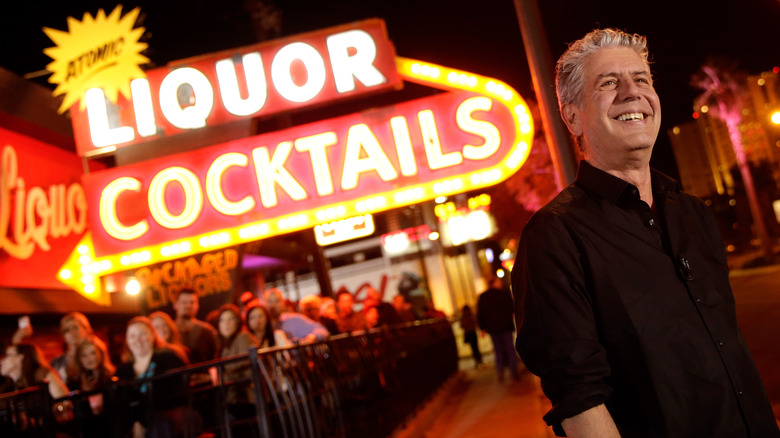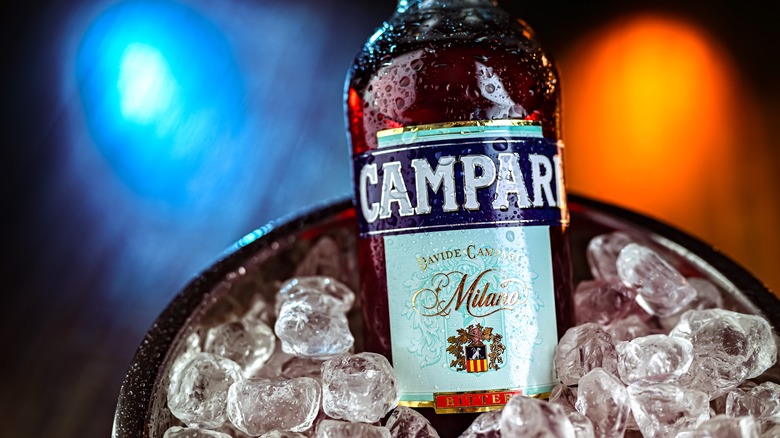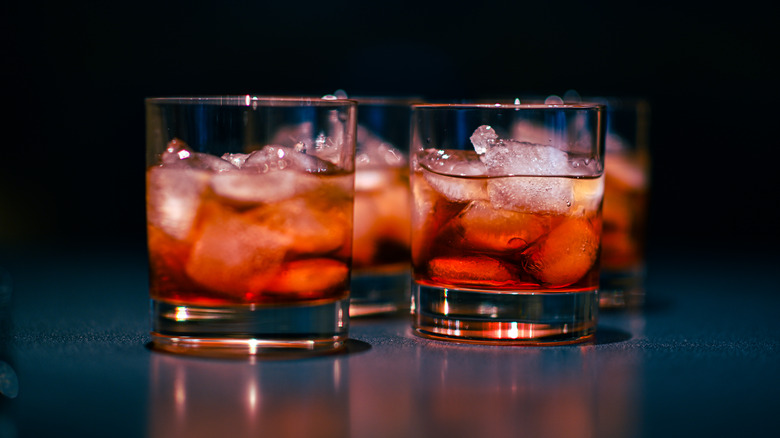Anthony Bourdain Disliked Every Ingredient In His Favorite Cocktail
Anthony Bourdain made a career of eating and drinking his way around the world, unearthing hidden gem restaurants and introducing audiences to foods they'd never before conceived of, much less sampled. At the end of the day though, he was a man who constantly saw beauty in the simple things. He knew that it doesn't take a vast amount of rare and fabled ingredients to make something delicious — it just takes a few high-quality ingredients and a skillful hand. This approach is perfectly exemplified by his favorite cocktail, the Negroni.
One of the most famous Italian cocktails, the Negroni is a combination of three liquors — gin, Campari, and sweet vermouth — traditionally garnished with a bit of orange peel. Curiously enough, Bourdain professed no love for any of the three on their own. In an interview with Barron's, the late chef and author admitted that, "it's three liquors that I'm not particularly interested in," noting a particular dislike for Campari and a deference towards the other two. However, he added, "put them together with a slice of orange ... it works". Bourdain admits that the first sip of a Negroni can be a bit confusing to the palate, but it's all about letting the three elements play together.
The elements of a Negroni
Of all the drink's ingredients, gin should be familiar to any cocktail lover; its colorless nature and neutral flavor profile make it one of the most popular and versatile bases for mixed drinks. There are some variations of the Negroni that swap the gin for another liquor such as rum or bourbon (the latter variation being known as a Boulevardier), but the classic preparation always calls for the herbaceous spirit, and a good Negroni needs a bold gin choice.
Vermouth is a type of fortified wine flavored with various herbs and spices such as juniper berries, anise, and orange zest. For a Negroni, it's important to use sweet vermouth to balance out the gin, but sweet vermouth can still be made with a range of ingredients and base wines. The specific brand you choose will play a huge role in shaping the identity of your Negroni.
Lastly, there is Campari, a bright red Italian liqueur made by infusing spirits with various botanicals. The exact formula is a closely guarded secret of the Campari brand, but when it comes to a traditional Negroni, no other substitute will do. Campari has a bitter flavor, with notes of citrus and spice. Its flavor is exceptionally strong, and Anthony Bourdain is far from the only person put off by its intensity. However, when combined with the other ingredients in a Negroni, that intense flavor is balanced out.
Assembling the perfect Negroni
The Negroni is the subject of a particularly notable origin story, which claims it was named after the Italian Count Camillo Negroni in the early 1900s. According to legend, the Count was dining at Caffè Casoni in Florence, where he ordered an Americano, a type of cocktail made with Campari, vermouth, and soda water. Deciding that this mixture was too weak for his liking, the Count asked for an alteration, specifically substituting the soda water with gin. The result was the stronger, and ultimately much more popular cocktail we know and love today.
The original version of a Negroni is a 1-to-1-to-1 cocktail, meaning it is made with equal portions of all three liquors, but just because that's how Count Negroni liked it doesn't mean it's not necessarily the best way to make this cocktail. Many modern versions of the Negroni increase the amount of gin and decrease the amount of Campari in order to better balance out the red liqueur's infamously strong taste.
Bourdain himself appeared to be a follower of this practice, even if he didn't admit so directly. When preparing a Negroni during an appearance on "Late Night With Jimmy Fallon" in 2012, Bourdain instructed viewers to follow the old 1-to-1-to-1 ratio, while simultaneously pouring himself a portion of gin that noticeably outweighed the other "thirds" of his beverage. If the strong flavors of Campari are similarly off-putting to you, it might be best to do as Bourdain did, not as he said.


